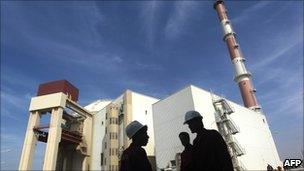Iran nuclear plans: Bushehr fuel to be unloaded
- Published

The Bushehr nuclear plant has been hit by repeated delays
Iran has confirmed it is having to remove nuclear fuel from the reactor at the Bushehr power plant, the latest in a series of delays to hit the project.
On Friday, the International Atomic Energy Agency (IAEA) said it had new information on "possible military dimensions" to Iran's nuclear plans, which Iran says are purely peaceful.
The IAEA will supervise the unloading of fuel from Bushehr, Iran's nuclear envoy Ali Asghar Soltanieh said.
Iran began the Bushehr project in 1976.
Iran's Fars news agency says the fuel is being removed for "technical reasons".
The fuel at Bushehr is being provided by Russia, which built the plant and whose engineers will carry out the unloading, under the supervision of the IAEA.
"Upon a demand from Russia, which is responsible for completing the Bushehr nuclear power plant, fuel assemblies from the core of the reactor will be unloaded for a period of time to carry out tests and take technical measurements," Mr Soltanieh said, according to the semi-official Isna news agency.
Computer virus?
The BBC's Tehran correspondent, James Reynolds, says diplomats suggest the entire core of the Bushehr plant is being replaced - potentially a serious problem.
There has been some speculation that the Stuxnet computer virus may be responsible, our correspondent says.
Analysts say Stuxnet - which caused problems at another Iranian enrichment facility last year - has been specially configured to damage motors commonly used in uranium-enrichment centrifuges by sending them spinning out of control.
Some experts believe that the problems at Bushehr call into question the safety and effectiveness of Iran's nuclear facilities as a whole, our correspondent says.
The IAEA report - obtained by the BBC and made available online by the Institute for Science and International Security (Isis), external - says Iran is "not implementing a number of its obligations."
These include "clarification of the remaining outstanding issues which give rise to concerns about possible military dimensions to its nuclear programme".
Six world powers are negotiating with Iran over its nuclear programme, and the country is subject to United Nations Security Council sanctions over its refusal to halt uranium enrichment.
Enriched uranium can be used for civilian nuclear purposes, but also to build atomic bombs.